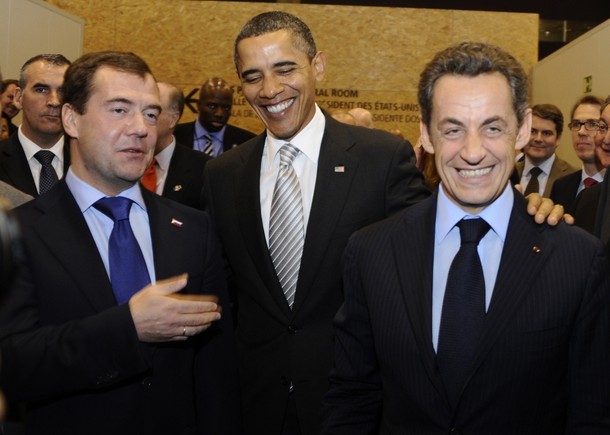
From Simon Shuster, Time: The Russian ambassador to NATO, Dmitri Rogozin, told TIME on Tuesday night that the divisions of the past two years, when official ties with NATO have been frozen, helped uncover the "red line" that the alliance is unwilling to cross. "The 2008 crisis was a test," he said. "For NATO, it showed that even though their lover boy [Georgia] got a thrashing, they will not enter into conflict with Russia." Rogozin said that despite [Georgian President Mikheil] Saakashvili‘s overtures, the Georgian President "remains a criminal" in Moscow’s eyes. "He shot Russian peacekeepers, which under international law is an attack on our entire country," he said. "But none of this impedes our relations with NATO."
This was clear at the Lisbon summit, where Russian President Dmitri Medvedev was treated as the guest of honor, and NATO went further than ever to placate Russia’s concerns over the alliance. It invited Russia to help build a missile-defense umbrella over Europe, a system that Russia has always seen as a threat to its arsenals. And in the new "strategic concept" that NATO adopted on Nov. 20 — its first in 10 years — the alliance declared for the first time that "NATO is not a threat to Russia."
But the white-flag-waving wasn’t mutual. Russia’s military doctrine, which states that NATO expansion is a top threat, was not discussed at all, and at one point Medvedev gave a stern reminder of Russia’s distrust. "Our participation [in the missile-defense system] should be absolutely equal," he told the summit. "Either we participate in full, exchange information, answer for the resolution of this or that problem, or we don’t participate at all. But if we don’t participate at all, then, for obvious reasons, we will have to defend ourselves. …"
What has changed in NATO, it appears, is its stomach for challenging Russia in the former Soviet space. Russia has shown that it will not back down to Western pressure in its backyard, and for NATO, the help that Russia can provide on global problems — Afghanistan, Iran, North Korea, terrorism — is just too valuable to risk a confrontation in Russia’s neighborhood. In any case, those are the lessons Russia is coming away with. "What’s important for NATO and the E.U. has little to do with Georgia," ambassador Rogozin says. "Your typical U.S. citizen has a very murky view of what’s going on in such places. The most important thing for them is to diffuse tensions." (photo: Reuters)
Image: reuters%2011%2025%2010%20Medvedev%20Obama%20Sarkozy.jpg
